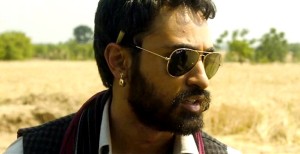 I know I say this every time I write an interview with Imran Khan, but I have to say it again: he truly is one of my favorite actors to interview. I always have a fabulous, in-depth conversation with him and this was true once again for his new movie, Matru Ki Bijlee Ka Mandola. In fact, we ran out of time, and I had to get a second call so we could finish our chat! Directed by Vishal Bhardwaj, MKBKM also stars Pankaj Kapur and Anushka Sharma, and sees Imran playing a character we have never seen from him before. From what we have seen of the trailers this film is a comedy-drama, but from talking with Imran we have learned there is much more to this story than meets the eye. Read on to see what the actor revealed about his process of becoming Matru, the moment with Anushka, and what we can expect to see when MKBKM hits theaters on January 11th.
I know I say this every time I write an interview with Imran Khan, but I have to say it again: he truly is one of my favorite actors to interview. I always have a fabulous, in-depth conversation with him and this was true once again for his new movie, Matru Ki Bijlee Ka Mandola. In fact, we ran out of time, and I had to get a second call so we could finish our chat! Directed by Vishal Bhardwaj, MKBKM also stars Pankaj Kapur and Anushka Sharma, and sees Imran playing a character we have never seen from him before. From what we have seen of the trailers this film is a comedy-drama, but from talking with Imran we have learned there is much more to this story than meets the eye. Read on to see what the actor revealed about his process of becoming Matru, the moment with Anushka, and what we can expect to see when MKBKM hits theaters on January 11th.
So who is Matru of Matru Ki Bijlee Ka Mandola?
Matru is actually a really interesting character because this is a guy who is from a small village in Haryana, but he is actually very highly educated. He has traveled to Delhi, he is a graduate of JNU University and by profession, by training he is actually a lawyer. A phrase that we came up with when they were describing the character to me, they said he’s a global villager. He is a guy from a small village who has traveled, he is worldly wise, he is educated, he is well read, and he knows a lot and he’s actually a guy who has chosen to go back to his roots, back to where he is because he wants to be part of that community and he wants to contribute to his community. So he chooses to dress a certain way, he chooses to speak a certain way so that he continues to fit in with the people, so that continues to be one of the people. What I really liked about it is it’s a very unusual depiction of youth. Normally when we show young people in our films they tend to be very frivolous and that tends to be the way young people are viewed the world over. But this is a very different way of looking at young people and it is frankly more representative of youth today. People are more socially and culturally aware.
At one point I was kind of looking over the character, looking through the script and trying to put my finger on it, and I figured out there are a lot of parallels between him and Che Guevara. That is where it really struck, that is what made me link on to the character, I said ok fine, now I’ve got who he is.
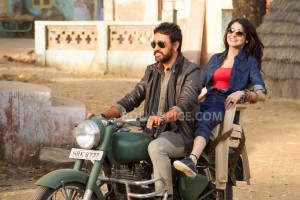 What drew you to say yes to this character?
What drew you to say yes to this character?
You know, it was very, very easy to attract me to this film. I mean it was Vishal Bhardwaj, the guy who has consistently made quality films one after the other. He narrated the script to me and I loved it. I went absolutely nuts on that. But I was very afraid about saying yes to this film because of the language. The film is set in Haryana and my character in the film speaks Haryanvi dialect, which is very close to Hindi, but is significantly different. And in my life I’ve never been exposed to Haryanvi, I’ve never heard Haryanvi, I’ve never met anyone from there. So I knew absolutely nothing about it. So I did have a few panicky moments. I told him, ‘Look I love the film. I would love to do it, but are you sure you want me for this? I mean are you sure that I can pull it off?’ And he said look, ‘I have faith in you. I believe that if you put in the hard work you will be able to pull it off. All I need is for you to promise me that you are going to work hard.’ So I said, ‘Okay that I can promise you.’ So he said, ‘Okay fine. You promise me that and I promise you we’ll pull it off together.’
And it sounded good, but the first reading, the first day that I went into the office to do a script reading with him, it was a disaster. I couldn’t form the words. I couldn’t string a sentence together. I went home and lay in bed and I couldn’t sleep and I am thinking, I just made the biggest mistake of my life and I’m going to be laughed out of the industry. So the next day I went in and said ‘Sir, it’s not looking good. I’m not feeling very confident.’ And he told me something amazing, ‘Look this kind of fear, this self-questioning, is something that drives artists to work harder. It can be an obstacle and slow you down or it can be a motivation to push you forward. It’s your call, what are you going to do?’ So I’m like, ‘Okay, fine I will work harder then’.
So I actually shifted base to Delhi. I went to Delhi and I started training with this theatre guy called N. K. Sharma. He has a theatre group in Delhi called Act One. I mean within the theatre circle this guy is a legend. He is really something. So he actually set up workshop with me with a couple of boys who were from Rohtak, Haryana. So I was spending 6-8 hours a day with these guys for 2 and a half months working on body language, working on character. See the thing is when I am doing an I Hate Luv Storys, when I’m doing Ek Main Aur Ekk Tu, I can always draw upon myself for elements of a character. However, the thing is when I’m playing Matru I 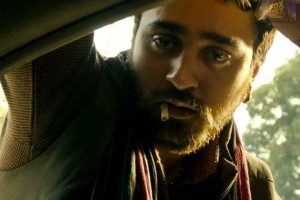 cannot use a single part of myself because it will be false. So Matru had to be created entirely, this entire 3-dimensional character, every single aspect of the character had to be created using something that is not mine. I can’t use a gesture I do, I can’t use the way I stand, the way I walk, I can use absolutely nothing of myself because none of it would fit. So suddenly you are on very, very high alert. You are watching everything single thing that these guys do. So whether you are on duty or off, even if you are on a coffee break, you are watching the guys, how do they stand, what do they do? There’s this one moment that I was talking to this guy and just while chatting with me, without thinking about it, he reached into his pocket and he pulled out a box of matches. He pulled out a matchstick and he used the match head to clean his ear, then he wipes the wax off on to his jeans, puts the matchstick back in the matchbox for later use, and put the matchbox in his pocket. Now he did this completely unaware that I was watching it. For him, it wasn’t even something to think about. He focused on what he was saying. But I caught that gesture I’m like okay, wait that is something I would have never thought of. So I ended up using that in the film. So it’s a lot of little things like this which are that would have never occurred to me, things that are not me, I had to learn them, pick them up and to hold on to them to use.
cannot use a single part of myself because it will be false. So Matru had to be created entirely, this entire 3-dimensional character, every single aspect of the character had to be created using something that is not mine. I can’t use a gesture I do, I can’t use the way I stand, the way I walk, I can use absolutely nothing of myself because none of it would fit. So suddenly you are on very, very high alert. You are watching everything single thing that these guys do. So whether you are on duty or off, even if you are on a coffee break, you are watching the guys, how do they stand, what do they do? There’s this one moment that I was talking to this guy and just while chatting with me, without thinking about it, he reached into his pocket and he pulled out a box of matches. He pulled out a matchstick and he used the match head to clean his ear, then he wipes the wax off on to his jeans, puts the matchstick back in the matchbox for later use, and put the matchbox in his pocket. Now he did this completely unaware that I was watching it. For him, it wasn’t even something to think about. He focused on what he was saying. But I caught that gesture I’m like okay, wait that is something I would have never thought of. So I ended up using that in the film. So it’s a lot of little things like this which are that would have never occurred to me, things that are not me, I had to learn them, pick them up and to hold on to them to use.
What did you learn about yourself and about acting in that experience?
You know never having had the benefit of learning acting from a teacher, a trainer, I didn’t really know how to go about building a character. So I always relied a lot on the dialogue, what is written on the page and I would use that as the guide. I had never really learnt how you can sit and create other aspects of a character, which have nothing to do with the lines. This has to do with how you stand, how you lean on something, what you do with your eyes, with your hands when you talk to someone. So much of it is non-verbal, it is the stuff that you are doing when you are not saying the words that the writer has written. What are you adding to it that is not already on the page. I learned how to make those things up.
And how to become them. Plus it must have been a challenge because the dialogue was something you weren’t comfortable with, so you couldn’t rely on that as much either.
Yeah. So here if you want to go off-script, if you want to improvise a moment, you can’t do it on the spur of the moment, you have to learn what words you can use.
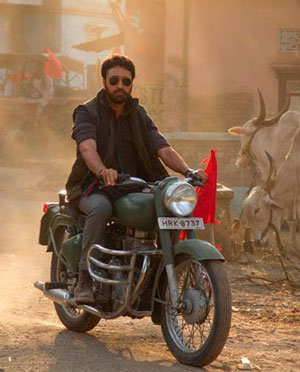 So how was it once you got on set to immerse yourself and be this character?
So how was it once you got on set to immerse yourself and be this character?
I was actually really surprised at the actual shooting process. Having worked largely with first time directors, you always have a certain style on set, you arrive and they tell you this where you are going to stand, that is where you are going to look, this is where the camera is, this is where the light is, so you’ve got to work within a certain constraint. But Vishal, he really believes in empowering his actors. I was not expecting that. I was expecting him to really be very mindful and really watch our performances very closely and micromanage our performances. As I said, his entire method is about empowering the actor. He gives you all the material and he gives you everything that you need and then he just sets you free. So he will sit with you and he will rehearse the hell out of it. He will make sure you know your scene, your character, your dialogue, inside-out, backwards and forwards. Then when you get on set he lets you free. He says stand where you want, sit down, stand, walk-off during the take, whatever you want. Just do something good and surprise me. So the more an actor brings, the more ideas an actor comes forward with, the more exciting it makes it. This is a guy who really, genuinely loves working with actors. More than how to frame a shot, how to do that stuff, he enjoys the process of working with an actor and then kind of pulling that performance out of them.
It must have been freeing and also scary at the same time.
It was damn scary. We were shooting this one scene where I was fumbling. We did a couple of takes and I fumbled and I messed it up and didn’t do it right. So I called for a cut and said, ‘Listen, could you just give me 5 minutes and sit down with me and work through it again, just so that I don’t mess up again.’ Vishal said ‘No, no, no don’t worry about that. I trust you. Do something good.’ He said, ‘We are going to go for a take right now. I trust you. Come on.‘ It shows tremendous faith in the actor. It again is really empowering, but it is scary as hell because here’s the entire unit standing and staring at you and the director said, ‘Do something good’. What does that mean? What is something good? What if I don’t do something good, then what? He’s said that he has faith in me, he’s expecting me to do something good – I have to deliver. So I mean it’s scary, but if you pull it off you suddenly feel like you can do anything.
Tell us about working with Pankaj Kapur, in what looks like such a crazy character.
He is a very scary actor to work with because this guy is a powerhouse performer. But his process is quite unusual. His process is like he is stretching a rubber band you know. So in the rehearsals and the prep time he is stretching the rubber band out and he doesn’t let it go, he doesn’t show you what it is going to be during the take. The second you call action, he lets go of that rubber band and it snaps and he does something great, but you are never really 100% sure of where it’s gonna go because he improvises, he goes off book and off script. You have to be ready to kind of roll with that. If you miss what he’s giving you the whole take collapses, it falls apart. So you have to be on guard, you have to be on your toes, you have to be ready to pick that up and run with it.
So again that must have been scary and at the same time great.
Yeah. I mean that is when the best stuff comes, when you start off really scared and then come through it okay.
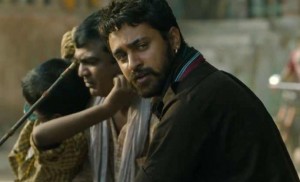 You also are starring with Anushka Sharma for the first time…
You also are starring with Anushka Sharma for the first time…
I’ve always had a sense that she’s a solid actress. But I really figured it out on the first day. The first scene that we shot together was a slightly emotional scene. Vishal called action and the two of us are sitting across from each other and she starts to talk and while she’s talking her eyes start to get moist and well up and this tear rolls down her face. I’m watching her create this moment. Now, this is the kind of thing when you watch it on screen, it’s always enhanced by background music and editing and all of that. But here I am, sitting right in front of her, there’s no background music there’s nothing, there’s just that moment with the two of us and it was an honest, genuine moment. I saw that and thought shit, this girl is a very, very strong actor. It was very honest.
It seems like Mr. Kapur and Anushka Sharma’s characters are mad and you are not so much…
Yeah, Matru is a strong, silent, sarcastic type.
So it must be interesting to play off of them…
Yeah, the struggle there is how to not get overwhelmed. The thing is personally I tend to get drawn to more silent, more still characters and those characters are often paired with mad-cap characters like say me and Kareena in Ek Main Aur Ekk Tu where the character in front of me is the one doing the loud stuff. So how do you hold on to your own in that. How do you not get swept away and how do you not get overshadowed.
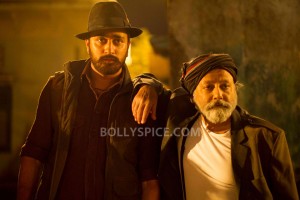 The music… I loved the whole essence of it…
The music… I loved the whole essence of it…
The music, I mean it’s Vishal, so the music is always kick-ass. What I really like about what he does is he tries to bring in story elements into the music. So since the film is set in Haryana, he actually met with Haryanvi folk musicians and he’s got a couple of them who are singing in the film. So when you hear some Haryanvi bits that are sung in there these are actual folk musicians. He has used some of the sounds, some of the instruments that they’ve used. Also in the first trailer, you saw a whole bunch of African dancers; again everyone is wondering what the hell is up with that. Now these are people who are not there just for effect they are there because of the story. There’s a proper explanation of who these people are and where they come from and what they are doing in the film. Now because they are actually a part of the film he has used African percussions in the title song. So when you hear the Matru song there is actual African style percussion and chanting. So the music does not stand alone from the film like a lot of Hindi film music can do that. You know, a lot of the songs are interchangeable, you can pull a song out of one film and put it into another film and it would be ok. But in this case the songs are integral to the film.
Your favourite scene in the film, can you tell us about that?
Wow! There’s a great scene. I think there might be a little bit of it that you get to see in the trailer. There’s a scene where Pankaj Kapur and I trying to move a well for the sake of public safety. We are concerned about the placement of the well that it could cause accidents so we take it upon our selves to move it. It’s late at night and both of us are quite drunk and we are attempting to move a well…
Looking back over your career from Jaane Tu… until now what would you say?
This is the first time in as many years I’ve been working that I really get the feeling that I’m in control of my work, that I’m in control of my performance, that I know what I’m doing. You know I’ve always felt that I am stumbling through, and whenever things go right it’s more just chance. It’s more that I try and keep trying and get something right, rather than knowing how to do something and doing it right. This is the first time in the time that I’ve been working that I know what to do and I know how to do it and I am in complete control of my performance.
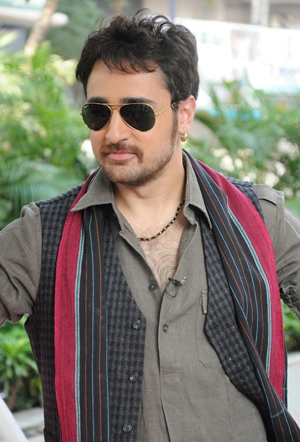 And this is such a challenging character that must be a cool feeling…
And this is such a challenging character that must be a cool feeling…
I think it’s the fact that I had to put so much work into it and that I had such a great support system. That really gave me the confidence to stretch out and to try it. Really I credit Vishal and credit NK Sharma my theatre coach in Delhi.
What is the hardest thing about being an actor?
I don’t know. I would imagine it’s different for different people depending on your personality and depending on what you want out of your career. For me, it’s not the work – I love the work, I love the people that I get to work with. That is absolutely great. That hard part for me is living the other part, the life of an actor, where suddenly nothing really belongs to you anymore, you are public property. I love the work, it doesn’t matter how long the hours go, how tough the role is, that’s great. I love working with other actors. I love working with the directors, but it’s the trappings of being an actor, of being in the public eye. Those things for me are harder to deal with. Again someone who’s dreamt of that all their life, they would enjoy that. For me I do the work because I like to do work not because I like the fame.
Is directing still your plan for the future?
Yes, definitely. It’s very much something that excites me that I want to do. And it will happen at some point.
What else are you working on?
Well, right now we are about a quarter way into shooting Once Upon a Time 2. As soon as I finish that I’m going to start Punit Malhotra’s film so that is lined up for early next year. I think we’ll start around March. I’m following up with a film with Tigmanshu Dhulia. It’s a film called Milan Talkies. That is very, very far out. We are not even half way through Once Upon a Time.
How is Once Upon a Time going?
I am having a lot of fun with Once Upon a Time because the film is set in the 80’s so from the look, to the characters, to the style of performance, everything changes because you are playing something that is a little bit larger than life. The volume is turned up to 11. (Laughs) So, when you are doing a dramatic scene you get to play it up a little bit. You get to play to the gallery. Similarly when you are doing humor, when you are doing romance, whatever you are doing you are playing with gallery. The cool moments are a little cooler than cool. It’s fun.
 Hindi films are certainly much more out in the world today, and films are getting huge openings in the UK and the US. What are your thoughts on that?
Hindi films are certainly much more out in the world today, and films are getting huge openings in the UK and the US. What are your thoughts on that?
You know I am always amazed that the kind of reach that the Hindi films have and it’s growing everyday. You have more and more people who are not of Indian origin watching Indian films. It’s not just the Indians who have settled abroad that are watching our films now. It is also people who are not Indians by ethnicity and to me that’s a great sign. It says that our films, the stories that we tell have a very wide reach. They are accessible to people and that anyone can relate to these characters. That’s a very good thing. I do see tremendous scope in the future. I feel that there will come a time, maybe not in my lifetime, but there will come a time where I see the potential for our Hindi films to overtake Hollywood films. The audience is growing. We make more films per year than Hollywood, we catch more eyeballs than Hollywood films do, but our average ticket price is so much lower that’s why we can’t compete at a dollar level. An average Hollywood film cost what, 10-12 dollars to watch? An average Hindi film costs just about a dollar to watch. So that’s why we can’t compete in terms of actual money. But the number of people watching our films it’s a lot more. I remember there was a time when earlier on in Aamir’s career the overseas market was just tiny, tiny, tiny little thing. It was barely big enough to be taken seriously. And today it’s grown into massive monster – a very significant part of our business. So that only happens because these people are dedicated and serious enough to do a trek and watch our films. It means a lot!
Back to MKBKM, what can audiences expect when they come see the film?
You know people hear Vishal’s name and they tend to think of very dark serious films and this is really the first time Vishal has really stepped away from that space and made what I think is a very, very funny film. The film is a farce comedy and it is a film that at a script level, while reading the script, there were a dozen places where I laughed out loud. So when you translate that script into a film I think it only gets funnier.
As you can see, Imran is very passionate about this movie and it was, like always, a fascinating, fun and educational experience to talk with him. I can’t wait to see Imran’s transformation into Matru when the film hits theaters on January 11th! Be sure to check out our interview with Anushka Sharma too!








